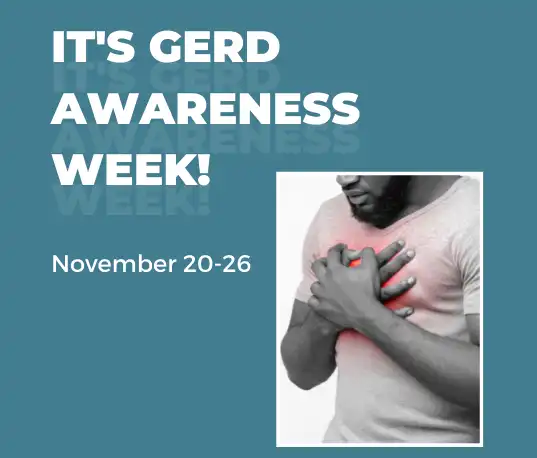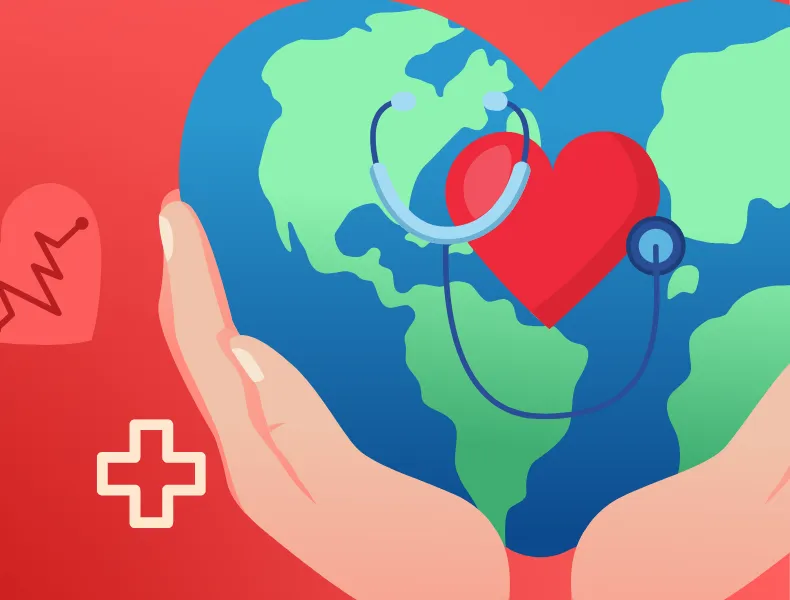Written and medically reviewed by Dorcas Morak, Pharm.D
GERD, gastroesophageal reflux disease, awareness week is celebrated annually. In 2022, it will be recognized from 20-26 November. It gives you a chance to play your role in encouraging people who are having symptoms of gastroesophageal reflux disease to speak with their doctors for advice and support.
In November 1999, IFFGD announced GERD Awareness Week for the first time. The occasion is marked on the calendar of US National Health Observances. The week is used by health professionals, educators, community organizations, and others to sponsor health promotion activities and raise public awareness of health-related concerns.
Read on to educate yourself about GERD.
What are the Facts about GERD?
Do you know that:
- 20% of Americans have GERD.
- Both adults and children can develop GERD.
- After age 40, vulnerability to GERD increases with age.
- Overweight or obesity is a risk factor for GERD.
- Pregnancy makes you more vulnerable.
- GERD is more frequent in smokers.
- Certain drugs can induce it.
- GERD is treatable.
What is GERD?
GERD is an acronym for gastroesophageal reflux disease which is caused by the irritating effect of stomach acid on the esophageal wall. It may eventually result in Barrett's esophagus, a precancerous condition in which the tissue lining the lower esophagus changes over time. Improper diagnosis and treatment of this condition may lead to esophageal cancer.
What are the Symptoms of GERD?
The symptoms of GERD include:
- Chronic heartburn.
- Belching.
- Dysphagia.
- Difficulty swallowing.
- Laryngitis.
- Chronic sore throat.
- Gum inflammation.
- Loss of tooth enamel.
- Chronic throat discomfort.
- Hoarseness in the morning.
- Sour taste.
- Bad breath.
What Causes GERD?
GERD occurs when the lower esophageal sphincter becomes weak and ineffective to prevent the stomach contents from refluxing back up into the esophagus. Your esophageal sphincter may become weak due to:
- Smoking (active or passive).
- Overeating.
- Being overweight.
- Pregnancy.
- Hiatal hernia (part of the stomach protrudes into the diaphragm muscle).
- Certain foods and drinks like fried or fatty foods, citrus, chocolate, coffee, carbonated drinks, and alcoholic beverages.
- Certain drugs like Alpha-blockers, anti-inflammatories, sedatives, etc.
If your medications cause you to experience the symptoms of GERD, talk to your doctor or pharmacist. They may consider switching or stopping the medication, but don’t stop your medications on your own.
What are the Stages of GERD?
GERD occurs in four stages. The severity of the condition is a factor of the amount of reflux into the esophagus which in turn is determined by the frequency and length of the reflux episodes. The four stages of GERD are:
- Mild GERD: there are only occasional minor symptoms. Lifestyle modification and over-the-counter antacids are the mainstays of treatment.
- Moderate GERD: the symptoms become more frequent, and you may need daily prescriptions for acid-suppressive drugs.
- Severe GERD: at this stage, the symptoms are poorly controlled even with prescription drugs. After a full evaluation from a GERD specialist, you may be treated with an effective anti-reflux technique that strengthens the lower esophageal sphincter.
- Esophageal cancer or precancerous lesions: after years of untreated GERD, it can result in esophageal cancer.
How is GERD treated?
GERD can be treated with medications and lifestyle modification. PPIs are commonly prescribed medications for GERD. Examples include Prilosec (omeprazole), Protonix (pantoprazole), Nexium (esomeprazole), Prevacid (lansoprazole), Aciphex (rabeprazole), etc.
Your doctor may prescribe you another class of drug called H-2 receptor blockers which are considered less effective than PPIs. An example is Pepcid (famotidine).
Recommended lifestyle modifications for GERD are:
- Weight loss if applicable.
- Smoking cessation.
- Avoiding large, fatty meals at night.
- Delaying lying down for several hours after eating.
- Sleeping with your head up (by raising the head of your bed 6-8 inches).
- Practicing stress management activities like yoga, meditation, etc.
- Avoiding foods like coffee, soda, citrus, onions, and mint.
Support people around you by showing them how to use the RxLess prescription discount program to get up to 88% discount on their medications at over 70,000 pharmacies nationwide.

















